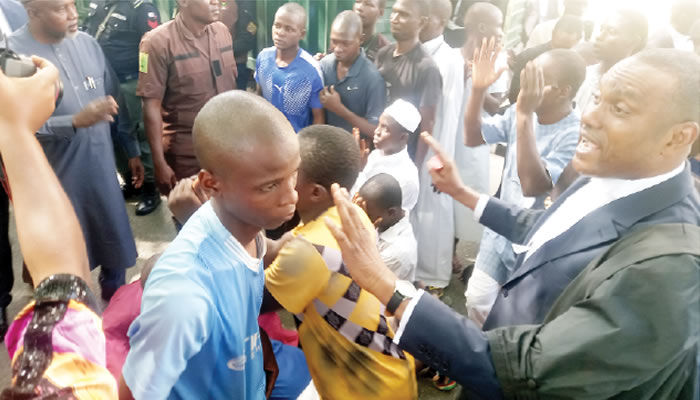The intersection of protest, minors’ rights, and law enforcement practices ignited a fiery debate in Nigeria following the #EndBadGovernance protests. The protests, spurred by economic hardship and governance concerns, escalated, leading to the arrest of 76 individuals, including 30 minors. These minors were subsequently charged with serious offenses, including treason and inciting a military coup, sparking outrage and prompting a presidential pardon. The core of the ensuing debate revolves around the legality and ethical implications of arresting and charging minors for such severe crimes, particularly considering the specific processes outlined in the Child Rights Act.
The National Human Rights Commission (NHRC) strongly condemned the police’s handling of the situation, arguing that the due process was disregarded and the charges of treason against children who raised foreign flags were unfounded and disproportionate. The NHRC questioned the rationale behind charging minors with treason, emphasizing the distress they experienced, even collapsing in the courtroom. They stressed the need for law enforcement officers to adhere to legal procedures specifically designed to protect the rights of children when involved in legal proceedings.
The Nigerian Police Force defended their actions, asserting that while they supported peaceful protests, the arrested individuals, albeit minors, were involved in activities aimed at destabilizing the government, which constituted treason. They clarified that the suspects were teenagers, not young children as portrayed on social media, suggesting that their age did not preclude them from criminal responsibility. The police maintained that their actions were justified given the seriousness of the offenses and that they followed established legal procedures for prosecuting minors as outlined in the Child Rights Act. This divergence in interpretation of the law and the appropriate application of the Child Rights Act formed a central point of contention.
Civil society organizations also weighed in on the issue, expressing concerns about the increasing trend of arresting minors for expressing dissent. They viewed this as a worrying development that could stifle freedom of expression and peaceful assembly. Additionally, they raised concerns about the rise in pro-government rallies, suggesting they were aimed at countering and suppressing dissenting voices. This broader context of perceived restrictions on civic freedoms further fueled the controversy surrounding the arrests of minors during the protests.
Underlying this debate are complex questions about the balance between national security, the right to protest, and the protection of children’s rights. The incident highlighted the challenges of applying existing laws to situations involving minors engaged in political protests, particularly when those protests escalate into alleged threats against the state. The #EndBadGovernance protests, while expressing legitimate grievances, also raised concerns about the potential for unrest and instability. The government’s response, including the arrest of minors, was seen by some as heavy-handed, while others argued it was necessary to maintain law and order.
The research report on the #EndBadGovernance protests further illuminated the complexities surrounding protests in Nigeria. The report explored the historical context of protests in the country, highlighting the evolving role of social media in amplifying civic action and mobilizing dissent. It also examined the varying regional responses to the protests, the implications for governance and human rights, and the tension between the rule of law and the exercise of fundamental freedoms. The report serves as a valuable resource for understanding the multifaceted dynamics at play in contemporary Nigerian protests, including the legal and ethical considerations related to the involvement of minors.


